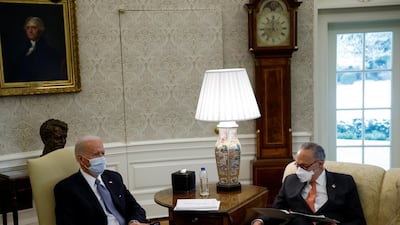Senate majority leader Chuck Schumer said he has reached a two-year power sharing deal with Republican leader Mitch McConnell, formally giving Democrats committee chairmanships.
The agreement, announced on Wednesday, will allow the chamber to function fully after weeks of procedural limbo.
It is based on a deal reached in 2001, the last time the 100-member chamber was divided 50-50.
That set-up allowed the same number of Republicans and Democrats on committees, although Democrats led the committees and the majority leader set the agenda on the floor.
Mr Schumer said it would spur committee work on President Joe Biden’s priorities and his Cabinet nominations, because Democratic chairmen will be in place and ground rules set for committee structure.
“I’ve already instructed the incoming Democratic chairs of all relevant committees to begin holding hearings on the climate crisis in preparation for enacting President Biden’s ‘build back better’ agenda, which includes major climate legislation,” Mr Schumer told the Senate.
While confirmations need a simple majority vote, Republicans will still hold significant sway on policy matters if the legislative filibuster remains intact.
They are already indicating that they will oppose important parts of Mr Biden’s agenda, including climate change legislation and an overhaul of immigration policy.
Mr McConnell has already said Mr Biden’s climate proposals will cost American jobs and competitiveness.
It could also be a challenge for Mr Schumer to keep centrist Democrats, such as Joe Manchin of West Virginia and Jon Tester of Montana, voting with the party on energy policies.
And most Republicans have rejected Mr Biden’s immigration plan as too generous for people who came to the US illegally.
That opposition, and the Senate’s need to confirm Mr Biden’s Cabinet and address the pandemic, threatens to push debate on immigration back to later this year.
As Senate leaders spent weeks negotiating the organising resolution, Mr McConnell agreed to drop his demand that Mr Schumer promise not to end the filibuster rule requiring 60 votes for most bills.
That came after two moderate Democrats, Mr Manchin and Kyrsten Sinema of Arizona, said they did not support changing current Senate practice.
Progressive Democrats are still pushing to erode the filibuster rule to allow the majority party to pass legislation with 51 votes.
Democrats have the majority only by virtue of Vice President Kamala Harris’s tie-breaking vote.
The Senate has been evenly divided only three times before: in 1881, 1953 and 2001.

